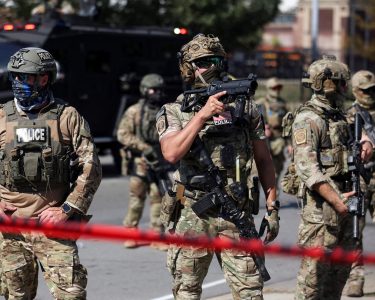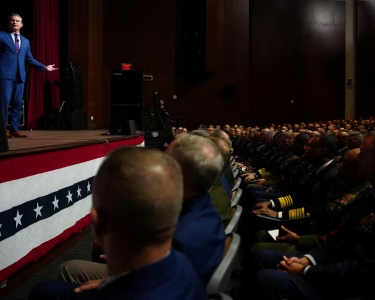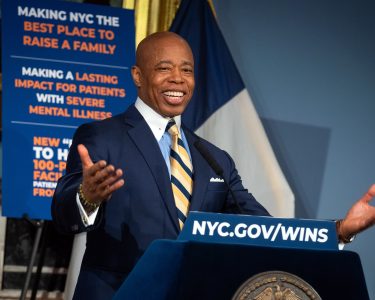Summary
- Trump vows his TikTok decision in the “not-too-distant future.”
- White House signals Biden will not act to save TikTok.
- Law was passed on national security grounds.
- TikTok cites constitutional free speech safeguards.
WASHINGTON, Jan. 17 (AfrikTimes) – The U.S. Supreme Court upheld a law on Friday that bans TikTok in the United States on national security grounds, unless its Chinese parent company, ByteDance, sells the short-video app by Sunday. In a unanimous 9-0 decision, the justices declined to intervene in the case, effectively ruling against TikTok, which is used by roughly half of all Americans.
The Court ruled that the law, passed by an overwhelming bipartisan majority in Congress last year and signed by Democratic President Joe Biden, does not violate the U.S. Constitution’s First Amendment protection against government abridgment of free speech. The justices affirmed a lower court’s decision that had upheld the measure after it was challenged by TikTok, ByteDance and some of the app’s users.
 Shou Zi Chew, Chief Executive Officer of TikTok. Kent Nishimura—Bloomberg via Getty Images.
Shou Zi Chew, Chief Executive Officer of TikTok. Kent Nishimura—Bloomberg via Getty Images.
“There is no doubt that, for more than 170 million Americans, TikTok offers a distinctive and expansive outlet for expression, means of engagement and source of community. But Congress has determined that divestiture is necessary to address its well-supported national security concerns regarding TikTok’s data collection practices and relationship with a foreign adversary,” the Court said in its unsigned opinion.
A statement issued by the White House suggested that Biden, in the final days of his presidency, would not take any action to save TikTok before the law’s Sunday deadline for divestiture. Republican Donald Trump, who opposed a TikTok ban, succeeds Biden on Monday.
“The Supreme Court decision was expected, and everyone must respect it,” Trump said in a social media post. “My decision on TikTok will be made in the not-too-distant future, but I must have time to review the situation. Stay tuned!” Trump also said he and Chinese President Xi Jinping discussed issues including TikTok in a phone call on Friday.
The Court’s unanimous decision highlighted its acceptance of the national security risks identified by Biden’s administration regarding China’s potential control over the app, which eased concerns about possible infringements on free speech.
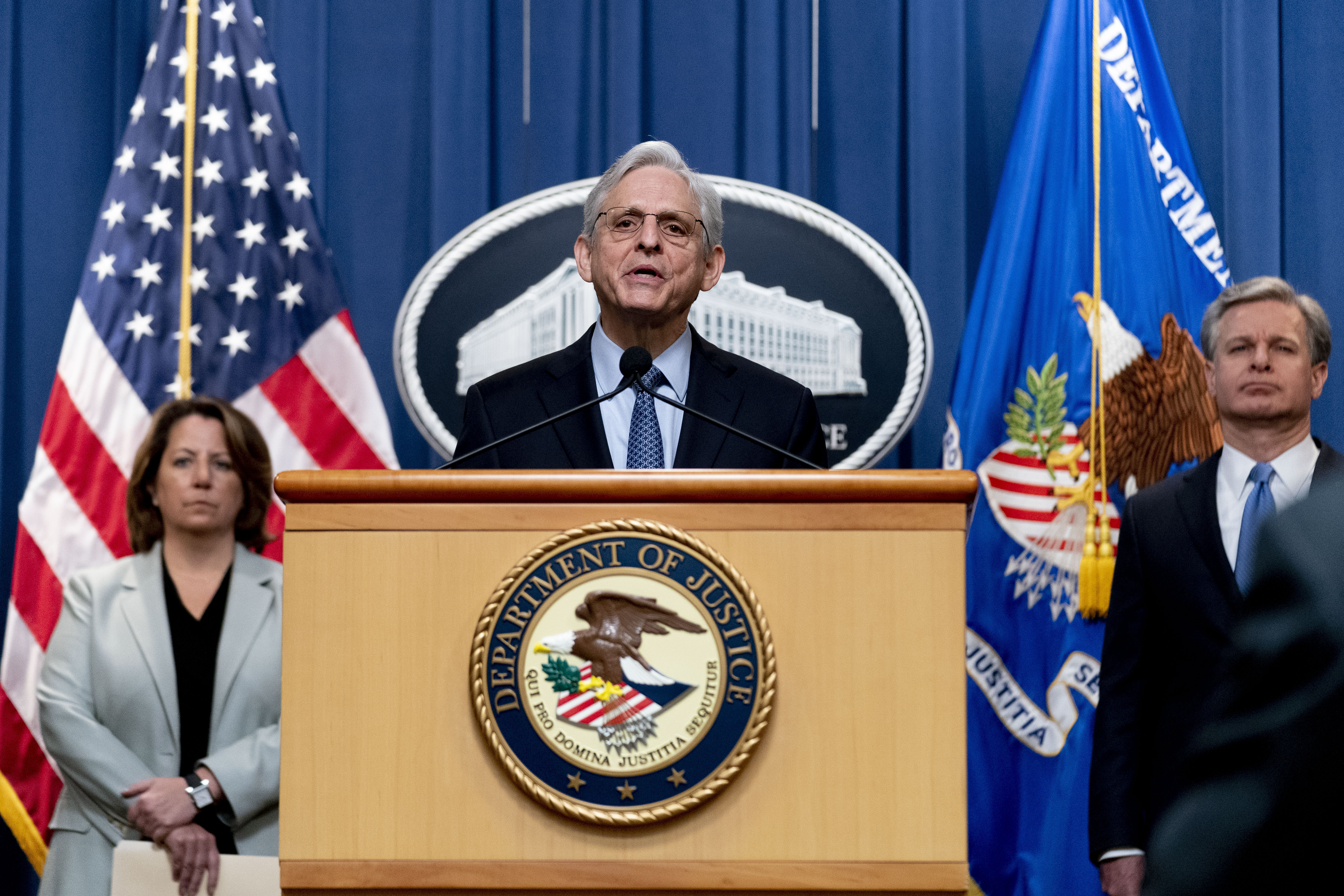 The Justice Department urges the Supreme Court to reject Trump’s push to pause the TikTok ban. In a legal filing on Friday, January 3, the department argued that the law effectively banning TikTok does not violate the First Amendment’s right to free speech.
The Justice Department urges the Supreme Court to reject Trump’s push to pause the TikTok ban. In a legal filing on Friday, January 3, the department argued that the law effectively banning TikTok does not violate the First Amendment’s right to free speech.
“TikTok’s scale and susceptibility to foreign adversary control, together with the vast swaths of sensitive data the platform collects, justify differential treatment to address the government’s national security concerns,” the Court said in the opinion.
White House Press Secretary Karine Jean-Pierre in a statement reiterated Biden’s position that “TikTok should remain available to Americans, but simply under American ownership or other ownership that addresses the national security concerns identified by Congress in developing this law.” Given the timing, Jean-Pierre added, action to implement the law “must fall to the next administration.”
TikTok is planning to shut down its U.S. operations on Sunday unless it receives a last-minute reprieve, according to sources familiar with the matter. TikTok CEO Shou Zi Chew will attend Trump’s inauguration on Monday, seated among other high-profile guests. TikTok did not immediately respond to a request for comment.
If Biden does not formally invoke a 90-day delay, as permitted by the law, companies providing services to TikTok or hosting the app could face legal liability. It remains unclear whether TikTok’s business partners including Apple, Google, and Oracle, will continue their operations with the app before Trump is inaugurated. This uncertainty leaves open the possibility of a TikTok shutdown on Sunday.
 Steven Mnuchin believes TikTok algorithm could be rebuilt if he buys it.
Steven Mnuchin believes TikTok algorithm could be rebuilt if he buys it.
The law also prohibits providing certain services to TikTok and other foreign adversary-controlled apps, including offering them through app stores like those operated by Apple and Google.
QUICK ACTION
The Supreme Court acted swiftly in the case, holding arguments on January 10—just nine days before the divestiture deadline set by the law.
TikTok, one of the most popular social media platforms in the United States, is used by about 170 million Americans, including a large number of young people. The platform’s powerful algorithm, its main asset, delivers short videos tailored to individual users’ preferences. TikTok offers a vast collection of user-submitted videos, often lasting under a minute, which can be viewed through its smartphone app or on the internet.
China and the United States are both economic and geopolitical rivals, and TikTok’s Chinese ownership has raised concerns among American leaders for years. The debate surrounding TikTok comes amid escalating trade tensions between the world’s two largest economies.
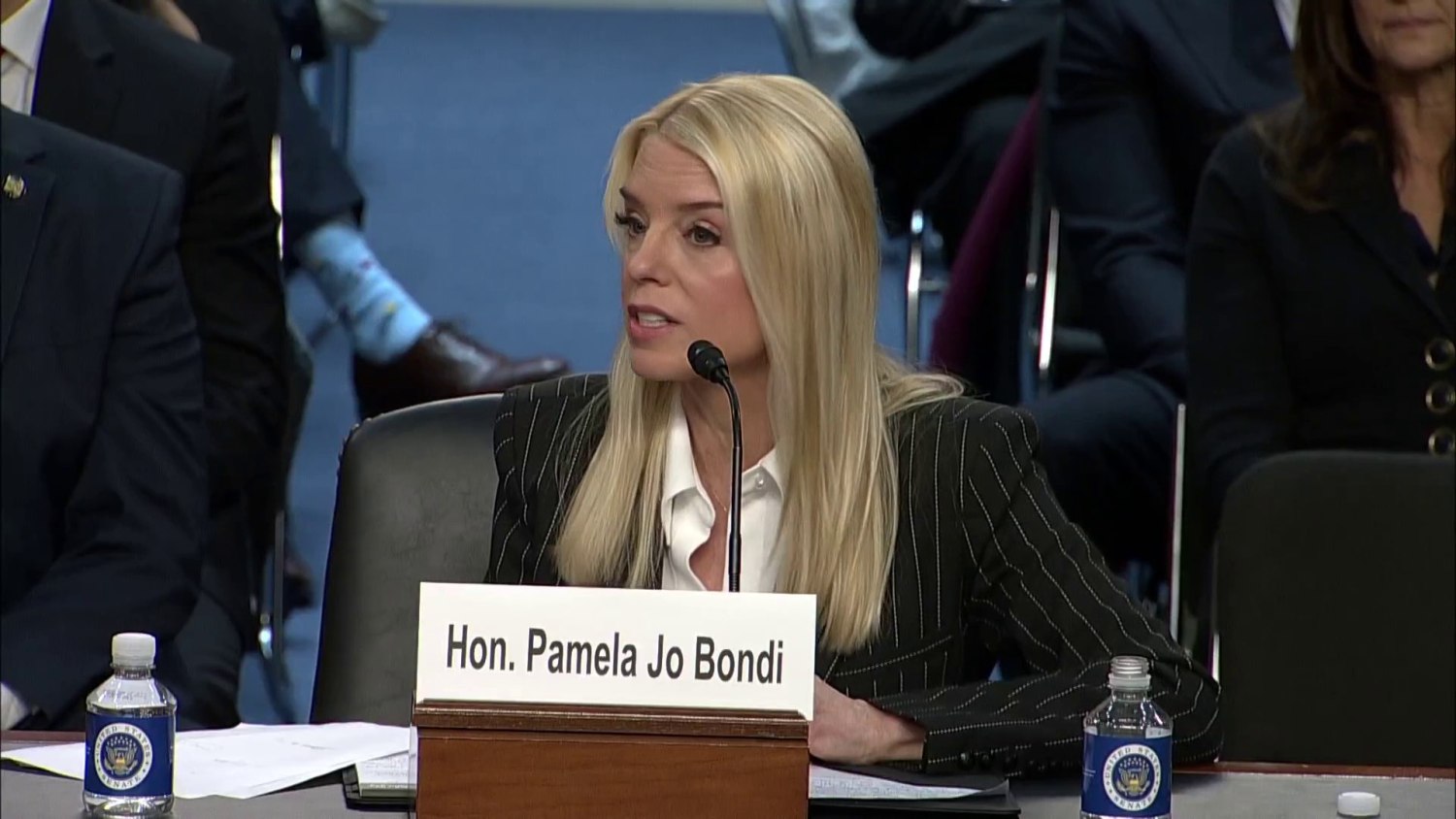 Attorney general nominee Pam Bondi refused to commit to enforcing the pending TikTok ban during questioning by Senator Richard Blumenthal, D-Conn., citing ongoing litigation within the Department of Justice.
Attorney general nominee Pam Bondi refused to commit to enforcing the pending TikTok ban during questioning by Senator Richard Blumenthal, D-Conn., citing ongoing litigation within the Department of Justice.
The Biden administration has emphasized that TikTok could continue to operate in the U.S. if it were freed from China’s control.
Attorney General Merrick Garland said in a statement the ruling affirmed that the law “protects the national security of the United States in a manner that is consistent with the Constitution.”
“The court’s decision enables the Justice Department to prevent the Chinese government from weaponizing TikTok to undermine America’s national security,” Garland said. “Authoritarian regimes should not have unfettered access to millions of Americans’ sensitive data.”
Deputy U.S. Attorney General Lisa Monaco added, “The next phase of this effort—implementing and ensuring compliance with the law after it goes into effect on January 19—will be a process that unfolds over time.” Monaco also noted that the Justice Department has long warned about the national security risks posed by China’s control of TikTok.
The law was passed last April, and TikTok, ByteDance, and some users who post content on the app challenged the measure. After losing in the U.S. Court of Appeals for the District of Columbia Circuit on December 6, they appealed the case to the Supreme Court.
 The White House urged Congress to quickly pass legislation introduced on Tuesday that would provide the federal government with new powers to ban Chinese-owned video app TikTok and other foreign-based technologies if they pose a national security threat, U.S. national security adviser Jake Sullivan said in a statement.
The White House urged Congress to quickly pass legislation introduced on Tuesday that would provide the federal government with new powers to ban Chinese-owned video app TikTok and other foreign-based technologies if they pose a national security threat, U.S. national security adviser Jake Sullivan said in a statement.
Trump’s opposition to the ban marks a shift from his first term in office when he sought to ban TikTok. Trump has said he has “a warm spot in my heart for TikTok,” believing the app helped him reach young voters in the 2024 election. While Trump has vowed to “save” TikTok, many of his Republican allies supported the ban.
FREE SPEECH RIGHTS
TikTok argues that the law threatens the First Amendment rights not only of the app and its users but also of all Americans. The company contends that the ban would negatively impact its user base, advertisers, content creators, and employee talent. TikTok has 7,000 employees in the U.S.
Noel Francisco, the lawyer for TikTok and ByteDance, told the Supreme Court during arguments that the app is “one of America’s most popular speech platforms,” and that the law would force it to “go dark” unless ByteDance executes a qualified divestiture.
Francisco argued that the U.S. government’s real target with this law is speech—specifically a concern that Americans could be “persuaded by Chinese misinformation.” However, Francisco emphasized that the First Amendment grants Americans the right to make their own decisions about such matters, not the government.


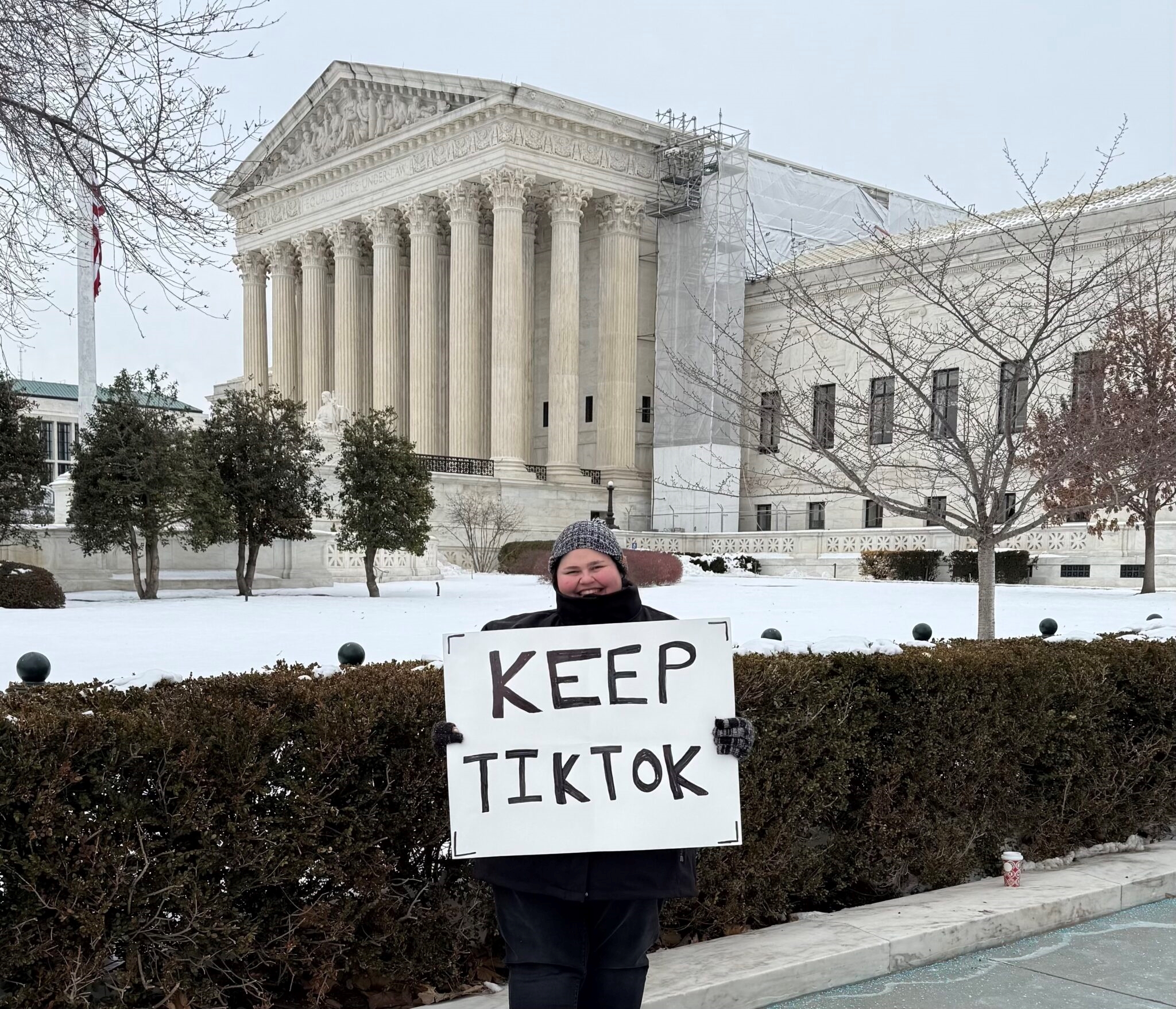

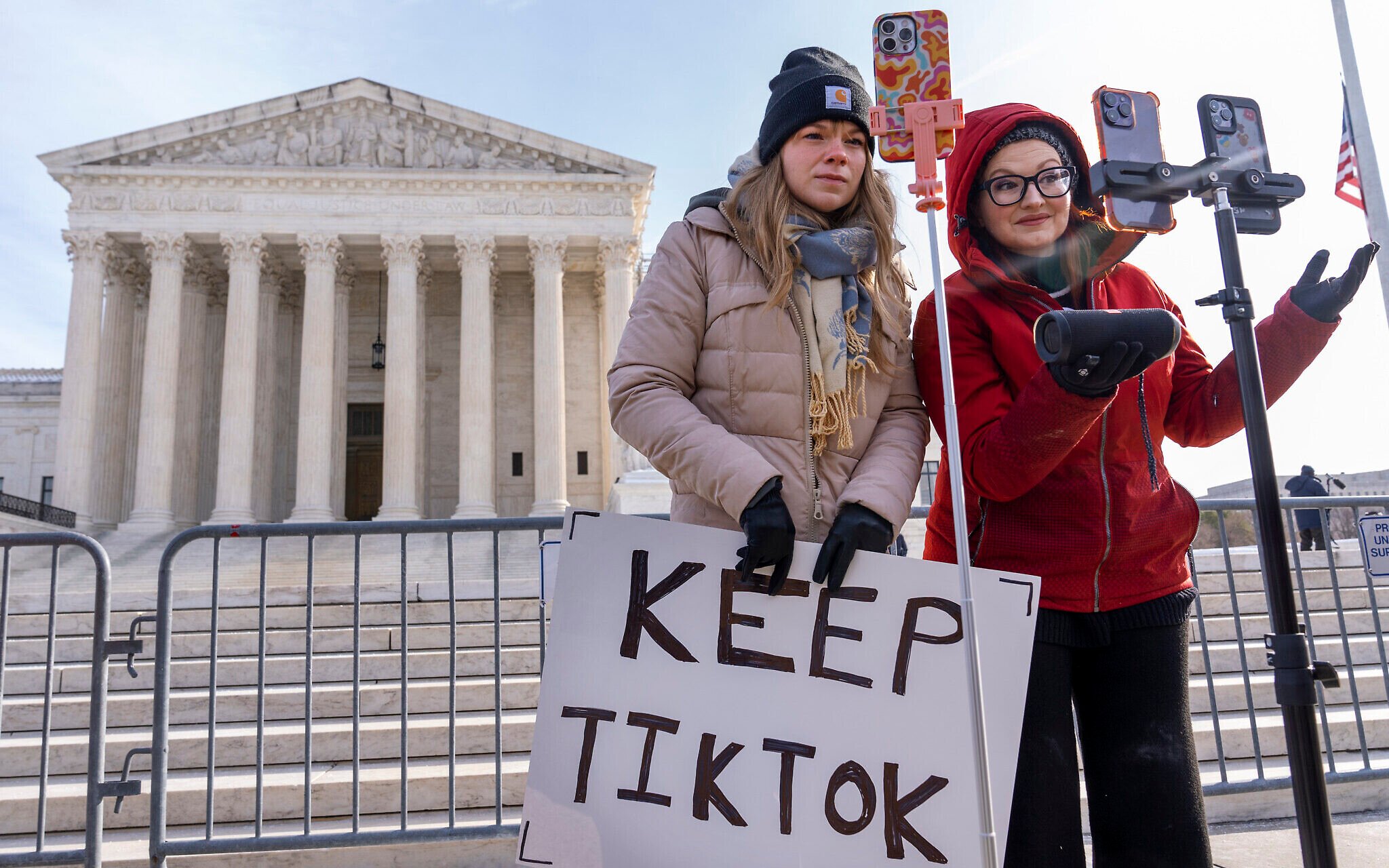 Sarah Baus, left, and Tiffany Cianci, who says she is a ‘long-form educational content creator,’ livestream to TikTok outside the Supreme Court, on Jan. 10, 2025, in Washington.
Sarah Baus, left, and Tiffany Cianci, who says she is a ‘long-form educational content creator,’ livestream to TikTok outside the Supreme Court, on Jan. 10, 2025, in Washington.
